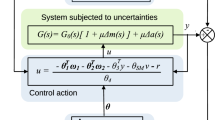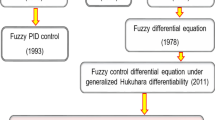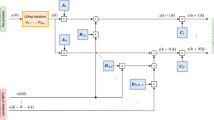Abstract
The Legendre orthogonal functions are employed to design the family of PID controllers for a variety of plants. In the proposed method, the PID controller and the plant model are represented with their corresponding Legendre series. Matching the first three terms of the Legendre series of the loop gain with the desired one gives the PID controller parameters. The closed loop system stability conditions in terms of the Legendre basis function pole (λ) for a wide range of systems including the first order, second order, double integrator, first order plus dead time, and first order unstable plants are obtained. For first order and double integrator plants, the closed loop system stability is preserved for all values of λ and for the other plants, an appropriate range in terms of λ is obtained. The optimum value of λ to attain a minimum integral square error performance index in the presence of the control signal constraints is achieved. The numerical simulations demonstrate the benefits of the Legendre based PID controller.
Similar content being viewed by others
References
HWANG C, GUO T Y. Parameter identification of a class of time-varying systems via orthogonal shifted Legendre polynomials [J]. Journal of the Franklin Institute, 1984, 318(1): 56–69.
PARASKEVOPOULOS P N. Legendre series approach to identification and analysis of linear systems [J]. IEEE Transactions on Automatic Control, 1985, 30(6): 585–589.
JUNG S M. Approximation of analytic functions by Legendre functions [J]. Nonlinear Analysis: Theory, Methods & Applications, 2009, 71(12): e103–e108.
WANG H, YU S. Tracking control of robot manipulators based on orthogonal neural network [J]. International Journal of Modelling, Identification and Control, 2010, 11(1/2): 130–135.
MOHAN B M, KAR S K. Optimal control of singular systems via orthogonal functions [J]. International Journal of Control, Automation and Systems, 2011, 9(1): 145–150.
MARZBAN H R, RAZZAGHI M. Optimal control of linear delay systems via hybrid of block-pulse and Legendre polynomials [J]. Journal of the Franklin Institute, 2004, 341(3): 279–293.
RAZZAGHI M, YOUSEFI S. Legendre Wavelet method for constrained optimal control problems [J]. Mathematical Methods in the Applied Sciences, 2002, 25(7): 529–539.
BENNETT S. The past of PID controllers [J]. Annual Reviews in Control, 2001, 25: 43–53.
ÅSTRÖM K J, HÄGGLUND T. PID Controllers: Theory, design and Tuning [M]. USA: Instrumentation Society of America, 1995: 120–273.
DATTA A, HO M T, BHATTACHARYYA S P. Structure and synthesis of PID controllers [M]. London, UK: Springer-Verlag, 2000: 15–235.
ZIEGLER J G, NICHOLS N B. Optimum settings for automatic controller [J]. Journal of Dynamic Systems, Measurement, and Control, 1993, 115(2B): 220–222.
WANG J S. Optimal design of PI/PD controllers for non-minimum phase system [J]. Transactions of the Institute of Measurement and Control, 2006, 28(1): 27–35.
HERREROS A, BAEYENS E, PERAN J R. Design of PID-type controllers using multiobjective genetic algorithms [J]. ISA Transactions, 2002, 41(4): 457–472.
MIKHALEVICH S S, BAYDALI S A, MANENTI F. Development of a tunable method for PID controllers to achieve the desired phase margin [J]. Journal of Process Control, 2015, 25: 28–34.
VILANOVA R. IMC based robust PID design: Tuning guidelines and automatic tuning [J]. Journal of Process Control, 2008, 18(1): 61–70.
PANDA R C, YU C C, HUANG H P. PID tuning rules for SOPDT systems: review and some new results [J]. ISA Transactions, 2004, 43(2): 283–295.
RAMASAMY M, SUNDARAMOORTHY S. PID controller tuning for desired closed loop responses for SISO systems using impulse response [J]. Computers & Chemical Engineering, 2008, 32(8): 1773–1788.
XU L. A proportional differential control method for a time-delay system using the Taylor expansion approximation [J]. Applied Mathematics and Computation, 2014, 236(1): 391–399.
HORNG I R, CHOU J H. Digital PID controller design via general discrete orthogonal polynomials [J]. International Journal of Control, 1988, 47(1): 188–192.
AYADI B, BRAIEK N B. MIMO PID controllers synthesis using orthogonal functions [C]// Proceedings of the 16th IFAC World Congress. Prague, Czech Republic: IFAC, 2005: 508–513.
BOUAFOURA M K, BRAIEK N B. PI?Dµ controller design for integer and fractional plants using piecewise orthogonal functions [J]. Communications in Nonlinear Science and Numerical Simulation, 2010, 15(5): 1267–1278.
HEUBERGER P S C, van den HOF P M J, WAHLBERG B. Modelling and identification with rational orthogonal basis functions [M]. London, UK: Springer-Verlag, 2005: 41–59.
COHEN G H, COON G A. Theoretical consideration of retarded control [J]. Transactions of American Society of Mechanical Engineers, ASME, 1953, 75(1): 827–834.
Author information
Authors and Affiliations
Corresponding author
Rights and permissions
About this article
Cite this article
Moradi, R., Tabatabaei, M. Proportional integral derivative controller design using Legendre orthogonal functions. J. Cent. South Univ. 23, 2616–2629 (2016). https://doi.org/10.1007/s11771-016-3323-6
Received:
Accepted:
Published:
Issue Date:
DOI: https://doi.org/10.1007/s11771-016-3323-6




